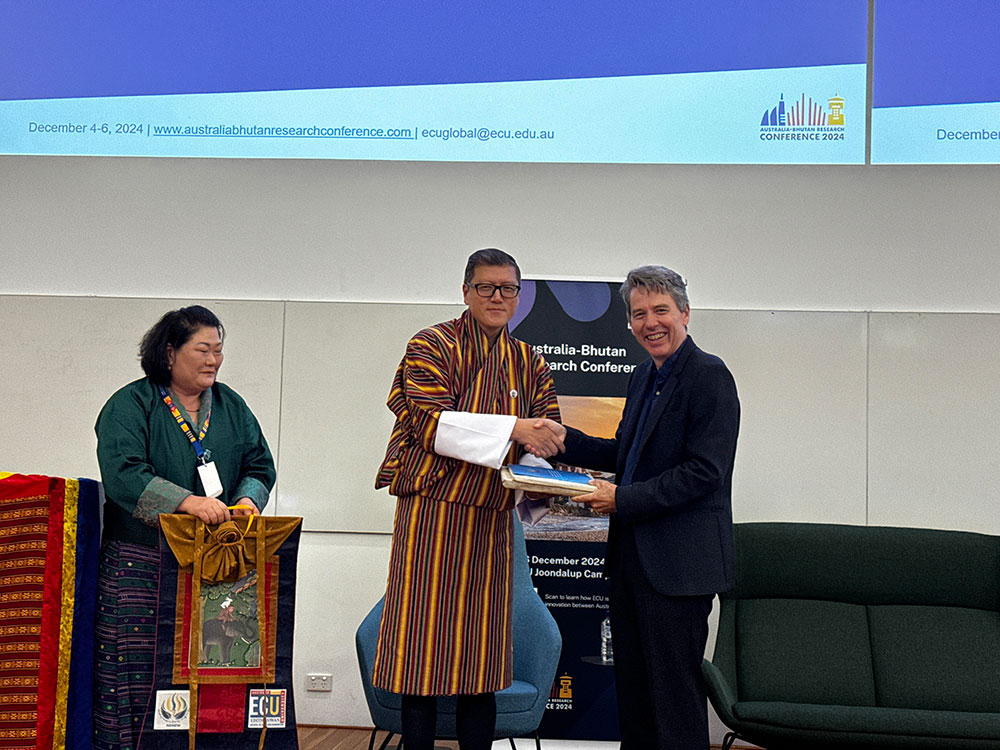With education as the corner stone of Bhutan-Australia relationship, the Royal Bhutan Embassy in Canberra and Edith Cowan University organised a three-day conference in Perth that ended yesterday.
The conference themed ‘interdisciplinary perspectives on emerging topics – bridging innovations between Australia and Bhutan’ brought together 70 Bhutanese researchers and researchers studying Bhutan.
Bhutan’s ambassador to Australia, Sonam Tobgay, said that with Australia having the largest pool of Bhutanese scholars, the conference aimed to bring the scholars together, instead of working in silos, to present their work and explore further opportunities for collaboration. “The other aim was to explore opportunities for commercialization of their research.”
He also said the conference could be a platform to contribute to Bhutan’s knowledge base and an avenue for experts to contribute to nation-building. “We hope to establish institutional partnerships between Australian universities and relevant institutes in Bhutan.”
Western Australia’s Minister for Culture and the Arts, Sports and Recreation, International Education, Heritage, David Templeman said that the themes of the conference were current and significant. “The world is at an interesting state and the importance of strong relationships, working together, and drawing on our education institutions and inspiring young people is very important.”
Presentations and discussions on the first day were mainly on happiness and wellbeing, leveraging digital innovation and technology for sustainable growth in Bhutan, understanding Bhutanese migrant experience and bridging and practice so that research could drive policy and business solutions.
The founding director of Royal Institute of Governance and Strategic Studies, Chewang Rinzin, said that there is a need to promote more research and data-based decision-making to ensure that policies and other interventions bring about the desired outcomes.
“We need to foster a strong and professional culture of research in the country, building synergies among research institutions and a promoting a dynamic mechanism to foster collaboration and resource optimization for research.”
He also said that bridging the gap between research and policy, or assessing the impact of research, will likely be a work-in-progress for a long time. “But that should not discourage us from exploring all possible ways to help good research find its rightful place in shaping policy decisions and the larger development agenda.”
One of the key note speakers at the conference and Chief executive officer of Druk Holdings and Investment (DHI), Ujjwal Deep Dahal, highlighted the need to build innovation as a pillar of Bhutanese economy. He also underscored the need to create a multichannel innovation fund to support the innovation ecosystem in preseedling, seeding and scaling ideas of local and global innovators, founders and academicians together.
Presentations on second and third days also included research on education, forest, climate change and environment, media, language, and governance.
The vice chancellor of ECU, Professor Clare Pollock, called ECU a true friend of Bhutan whose collaboration with Bhutan flourishes through meaningful initiatives and shared commitment to education and societal progress.
She said the conference showcases the strength of academic and cultural ties between the two countries. “Let’s make the most of this opportunity to share ideas, build connections, and find innovative ways to drive policy, business, and societal solutions together.”
Meanwhile, there are about 34,000 Bhutanese studying, working and living in Australia, making it home to the largest Bhutanese diaspora. Of that, around 24,000 reside in Western Australia.
Ambassador Sonam Tobgay said Bhutanese researchers make significant contributions in Australia. “A Bhutanese innovator discovered anti-inflammatory drugs derived from Australia’s indigenous plants with three of his findings now patented. Another played a key role in developing a groundbreaking machine for cornea surgeries.”
There are also wheat expert advising farmers in NSW and citrus experts working in mega farms.
At the end of the conference yesterday, researchers shared suggestions on improving research culture in Bhutan and bridging the gap between research and policy in each of the themes presented at the conference.
The next conference is proposed to be held at RIGSS in Phuentsholing, Bhutan in 2025.
Contributed by Tashi Dema and Tshering Palden, who worked for Kuensel before and are now pursuing their PhD


